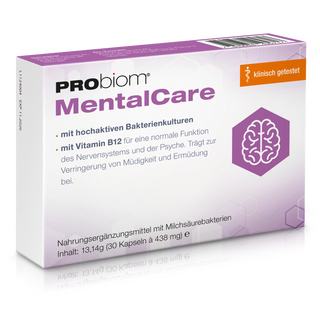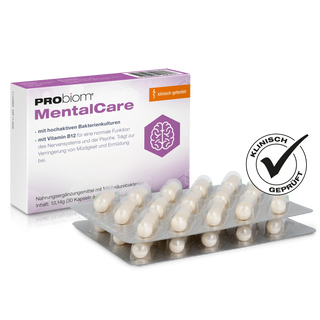Antibiotics are among the greatest medical achievements of the 20th century. They have saved millions of people from life-threatening bacterial infections and are an indispensable part of modern medicine. However, anyone who has ever undergone antibiotic therapy knows that while the infection may be cured, the body often feels weak and depleted for days or even weeks.
This physical weakness after antibiotics is not an isolated case—in fact, it's one of the most common after-effects of antibiotic treatment. But why is this so? And, above all, what can you do to recover faster?
What antibiotics do in the body
Antibiotics fight bacteria by inhibiting their proliferation or killing them outright. The problem is that they don't distinguish between "good" and "bad" bacteria. This not only affects the pathogens, but also a significant portion of the beneficial microorganisms that are important for our health.
The gut—the center of our immune system—is home to billions of bacteria that are involved in digestion, vitamin production, and even mood regulation. When this community is depleted by an antibiotic, a finely tuned system is thrown out of balance. The consequences range from digestive problems to fatigue and exhaustion.
The most common causes of physical weakness after antibiotics
Disturbed intestinal flora (microbiome dysbiosis)
The most significant cause of weakness after a course of antibiotics is the change in the intestinal microbiome.
A healthy gut contains a diverse range of bacterial species that regulate each other. Antibiotics drastically reduce this diversity. As a result, digestive processes can slow down, vitamin production may be impaired, and nutrients may be absorbed less efficiently.
The result: The body has fewer “building materials” and energy sources, which manifests itself in the form of fatigue.
Nutrient deficiencies
The intestinal flora plays an important role in the absorption and synthesis of micronutrients such as vitamin B12, folic acid, biotin, iron, and magnesium. If this absorption is disrupted, cellular performance decreases. Vitamin B deficiency can manifest itself in fatigue, poor concentration, and even mood swings.
Detoxification and repair processes
During an infection and the subsequent use of antibiotics, the body is in overdrive. It has to break down dead bacteria, neutralize the endotoxins released by the medication, and repair damaged tissue. These processes consume enormous amounts of energy, which is then lacking in everyday life.
Aftereffects of the disease
Not all exhaustion is caused by the medication itself. Often, the underlying infection has already placed a significant strain on the body. The immune system, muscles, and even the nervous system need time to return to normal performance levels.
How physical weakness manifests after antibiotics
The symptoms vary greatly from individual to individual, but depend largely on how severely the microbiome has been damaged and how stressful the infection was.
Typical signs are:
-
pronounced fatigue despite sufficient sleep
-
Muscle weakness or low resilience
-
mental exhaustion and concentration problems
-
Digestive disorders such as flatulence or diarrhea
-
Lack of motivation and slight irritability
-
in some cases headaches or dizziness
Often several of these symptoms occur simultaneously and can last for days or weeks.
The duration of the weak phase
How long physical weakness lasts after antibiotics varies greatly from person to person.
-
In the case of mild infections and short-term use, the body can recover within a few days.
-
After prolonged antibiotic therapy or serious illnesses, recovery can take several weeks.
-
In cases of pre-existing intestinal problems, nutrient deficiencies or chronic diseases, the recovery time is often significantly longer.
Scientific studies show that in some cases, the intestinal flora only fully regenerates after a course of antibiotics after several months.
Strategies for faster recovery
There are several approaches to specifically support the body's regeneration. The rule of thumb is: the sooner treatment is started after antibiotic treatment, the better.
Nutrition for intestinal health
A gut-friendly diet is the most important building block.
-
Focus on fiber-rich foods such as whole grains, legumes, vegetables and fruit.
-
Incorporate fermented foods such as sauerkraut, kimchi, yogurt, or kefir to provide probiotic cultures.
-
Avoid highly processed foods, excessive sugar, and alcohol, as these can further disrupt bacterial balance.
Probiotics and prebiotics
Probiotic preparations can help to specifically colonize the intestinal flora with beneficial bacteria species.
Prebiotics—fibers that serve as food for good bacteria—promote their growth and activity. A combination of both is often particularly effective.
Compensate for nutrient deficiencies
After a blood test, targeted supplementation can be administered: Vitamin B complex, magnesium, iron, and zinc are often beneficial. It's important not to take high doses "just in case," but to approach each individual individually.
Gentle movement
Light physical activity such as walking, stretching exercises or gentle yoga improves blood circulation, stimulates the metabolism and promotes oxygen supply to the cells – without overloading the body.
Sufficient sleep and breaks
The body regenerates most effectively during sleep. A regular rhythm and short rest breaks during the day can significantly accelerate the recovery process.
Summary: Causes and countermeasures
| Caused | Effect in the body | Recommended support |
|---|---|---|
| Disturbed intestinal flora | Poor digestion, fewer vitamins | Probiotics, fermented foods, high-fiber diet |
| Nutrient deficiency | Reduced cell energy | Check blood values, targeted supplementation |
| Detoxification processes | High energy consumption | Drink plenty of fluids, antioxidant foods, liver support |
| Aftereffects of the infection | Muscle weakness, fatigue | Light exercise, sleep, protein-rich diet |
When medical help is needed
Although weakness after antibiotics is usually harmless and temporary, there are situations in which a doctor should be consulted:
-
Weakness lasting more than three weeks
-
Fever or renewed signs of infection
-
severe weight loss
-
persistent diarrhea or blood in the stool
-
significant worsening of symptoms
These symptoms may indicate complications, persistent infections, or serious nutritional deficiencies.
Conclusion
Physical weakness after antibiotics is widespread and has understandable causes – from disrupted intestinal flora to nutrient deficiencies to the after-effects of the illness. With a targeted diet, probiotic support, sufficient rest, and gentle exercise, the recovery process can be noticeably accelerated. Giving your body time and the right tools can not only restore energy but even strengthen your immune system in the long term.

















